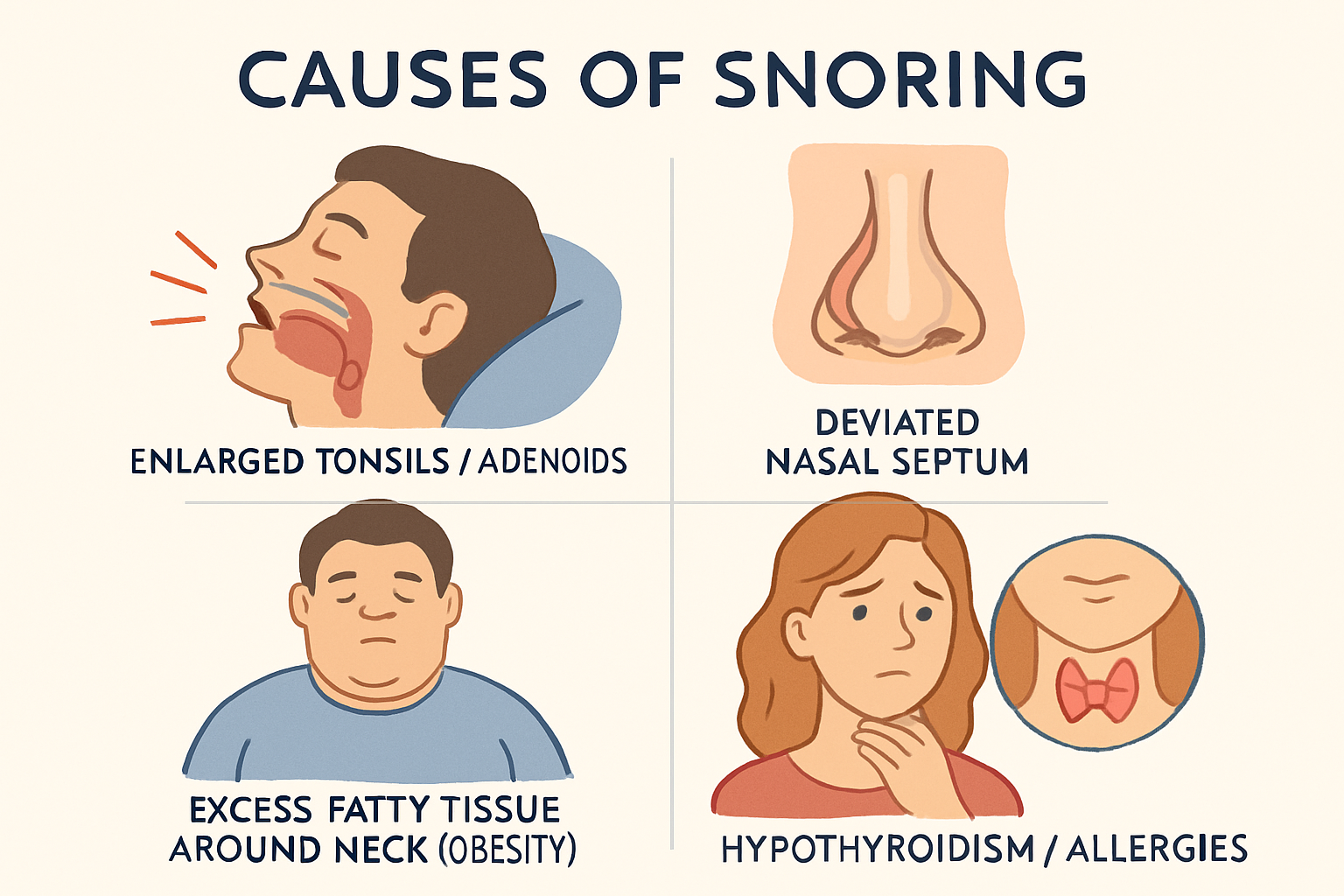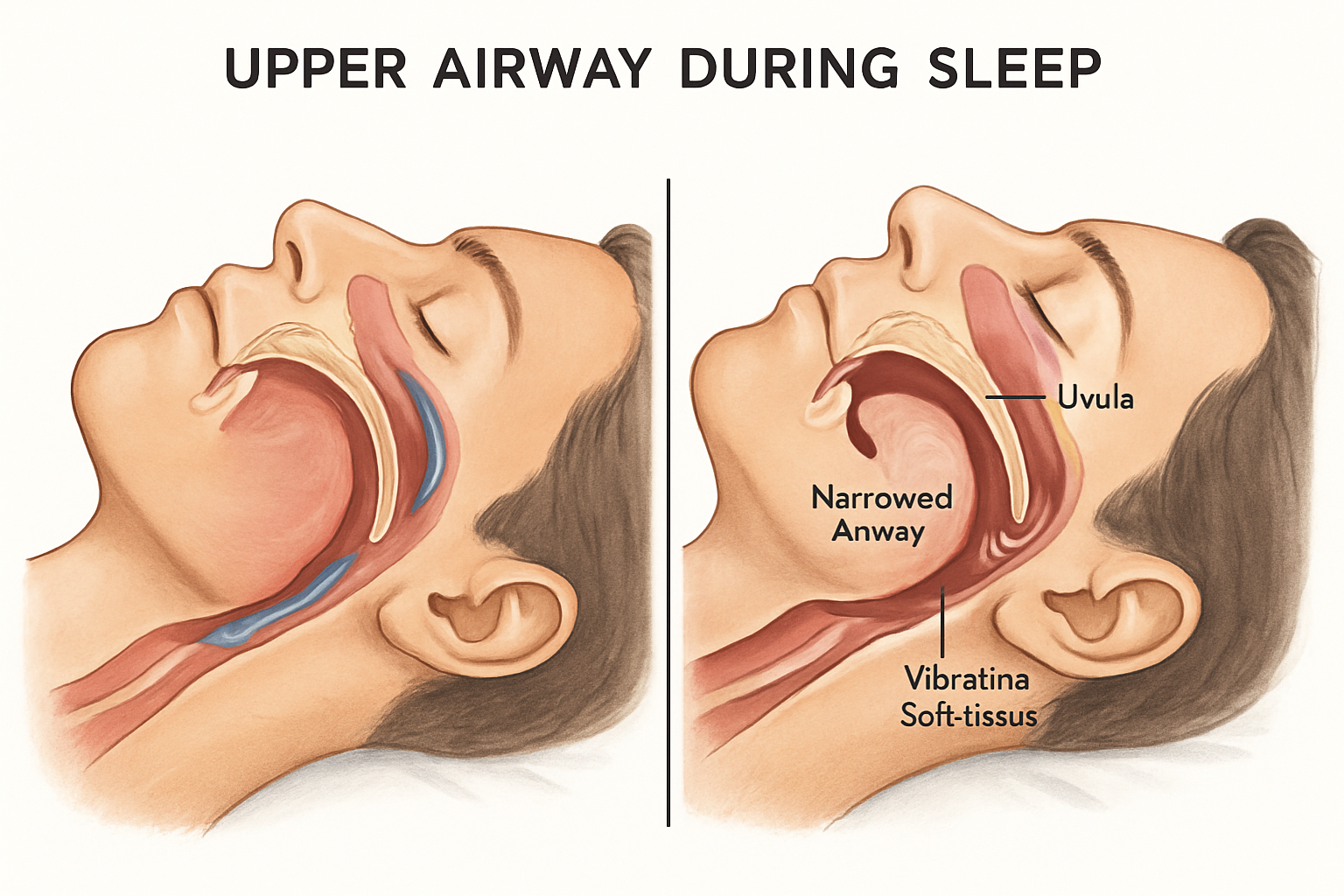
Medical Disclaimer: This article provides educational information about medical causes of snoring. Always consult with healthcare professionals for proper diagnosis and treatment of medical conditions.
Snoring is often dismissed as a mere annoyance, but it can be a symptom of underlying medical conditions that require attention. While occasional snoring may be harmless, persistent or loud snoring can indicate serious health issues that need medical evaluation and treatment.
This comprehensive analysis explores the various medical causes of snoring, from anatomical factors to underlying health conditions, helping you understand when snoring requires medical attention and what treatment options are available.
Understanding the Mechanism of Snoring
Snoring occurs when the flow of air through the mouth and nose is partially blocked during sleep. This obstruction causes the surrounding tissues to vibrate, producing the characteristic snoring sound. The blockage can occur at various points in the upper airway, from the nose to the throat.
Anatomical Causes of Snoring
1. Nasal Obstruction
Nasal congestion or obstruction is a common cause of snoring:
- Deviated Septum: A crooked nasal septum can block airflow through one or both nostrils
- Nasal Polyps: Non-cancerous growths in the nasal passages
- Enlarged Turbinates: Swollen nasal tissues that block airflow
- Allergies: Seasonal or environmental allergies causing nasal congestion
2. Throat and Airway Issues
- Enlarged Tonsils and Adenoids: Common in children but can affect adults
- Uvula Problems: An elongated or swollen uvula can vibrate during sleep
- Narrow Airway: Some people naturally have a narrower throat
- Soft Palate Issues: Weak or elongated soft palate can collapse during sleep
3. Jaw and Tongue Position
- Retrognathia: A recessed lower jaw that pushes the tongue backward
- Large Tongue: Macroglossia can block the airway
- Tongue Position: The tongue falling back during sleep
💡 Key Insight
Anatomical causes of snoring are often treatable with medical interventions, including surgery, oral appliances, or lifestyle modifications.
Medical Conditions That Cause Snoring
1. Sleep Apnea
Sleep apnea is one of the most serious medical causes of snoring:
- Obstructive Sleep Apnea (OSA): The airway becomes completely blocked during sleep
- Central Sleep Apnea: The brain fails to signal the muscles to breathe
- Complex Sleep Apnea: A combination of both types
2. Obesity and Weight-Related Issues
- Excess Weight: Fat deposits around the neck narrow the airway
- Metabolic Syndrome: Associated with increased snoring risk
- Diabetes: Can contribute to sleep-disordered breathing
3. Respiratory Conditions
- Asthma: Can cause nighttime breathing difficulties
- Chronic Obstructive Pulmonary Disease (COPD): Affects breathing patterns
- Bronchitis: Inflammation of the airways
4. Cardiovascular Conditions
- Heart Failure: Can cause fluid buildup affecting breathing
- Hypertension: Often associated with sleep apnea
- Arrhythmias: Irregular heart rhythms can affect sleep
5. Neurological Disorders
- Stroke: Can affect breathing control
- Parkinson's Disease: May cause breathing irregularities
- Multiple Sclerosis: Can affect respiratory muscles

Lifestyle and Environmental Factors
1. Alcohol and Medications
- Alcohol: Relaxes throat muscles, worsening snoring
- Sedatives: Can cause excessive muscle relaxation
- Muscle Relaxants: May affect airway muscle tone
- Certain Antidepressants: Can cause weight gain or muscle relaxation
2. Smoking
Smoking can cause:
- Inflammation of the airways
- Increased mucus production
- Reduced lung function
- Higher risk of sleep apnea
3. Sleep Position
- Back Sleeping: Gravity pulls the tongue and soft tissues backward
- Poor Pillow Support: Can cause neck strain and airway obstruction
When to Seek Medical Attention
Consult a healthcare professional if you experience:
- Loud, persistent snoring
- Snoring with breathing pauses
- Gasping or choking during sleep
- Excessive daytime sleepiness
- Morning headaches
- Difficulty concentrating
- High blood pressure
- Recent weight gain
Diagnostic Process
1. Medical History
Your doctor will ask about:
- Sleep patterns and quality
- Medical conditions and medications
- Lifestyle factors (alcohol, smoking, weight)
- Family history of sleep disorders
2. Physical Examination
- Examination of the nose, throat, and mouth
- Assessment of neck circumference
- Evaluation of jaw structure
- Blood pressure measurement
3. Sleep Study
If sleep apnea is suspected, a sleep study may be recommended:
- Polysomnography: Comprehensive overnight sleep study
- Home Sleep Test: Simplified sleep monitoring at home
Treatment Options
1. Lifestyle Modifications
- Weight Loss: Even modest weight loss can significantly reduce snoring
- Sleep Position: Sleeping on your side can help
- Avoid Alcohol: Especially before bedtime
- Quit Smoking: Improves overall respiratory health
2. Medical Treatments
- CPAP Therapy: For sleep apnea
- Oral Appliances: Reposition the jaw during sleep
- Nasal Devices: Nasal strips or dilators
- Medications: For underlying conditions
3. Surgical Options
- Septoplasty: Corrects deviated septum
- Tonsillectomy: Removes enlarged tonsils
- Uvulopalatopharyngoplasty (UPPP): Removes excess throat tissue
- Maxillomandibular Advancement: Repositions the jaw
Prevention Strategies
- Maintain a healthy weight
- Exercise regularly
- Practice good sleep hygiene
- Manage allergies and nasal congestion
- Avoid alcohol and sedatives before bed
- Sleep on your side
- Keep the bedroom cool and humidified
Conclusion
Snoring can be caused by various medical conditions, from simple anatomical factors to serious health issues like sleep apnea. Understanding the underlying cause is crucial for effective treatment.
If you or a loved one experiences persistent or loud snoring, especially with other symptoms like breathing pauses or excessive daytime sleepiness, it's important to seek medical evaluation. Early diagnosis and treatment can prevent serious health complications and improve quality of life.
Remember, while snoring is common, it's not always harmless. Taking it seriously and addressing the underlying causes can lead to better sleep, improved health, and enhanced quality of life.